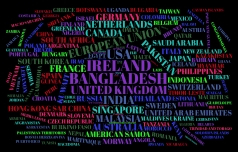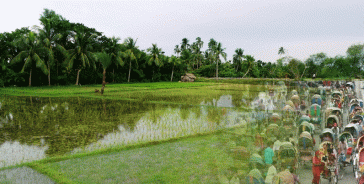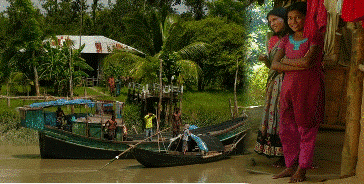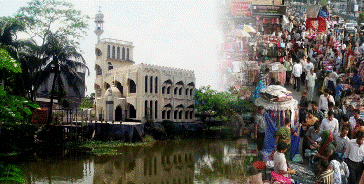 ‘Celebrity status?’, you ask. ‘Why not?’, I reply. It shouldn’t be that difficult, should one wish, to join the cult of pervasive, pointless ‘celebrity’ that characterises contemporary society. (Mind you, I have just read an article in Newsweek, 2009 ‘The Greatest Show on Earth’, by Neal Gabler in defence of celebrity culture. Drawing on the work of Boorstin, he compares tabloid culture with other entertainment and art forms. (Update: I had a link to this article originally, but unfortunately the Newsweek archives only go back to 2013 now.) P.S. I’ve since read Chris Hedges‘ book Empire of Illusion: The End of Literacy and the Triumph of Spectacle. An altogether more sobering thesis!) For me, for now, being in Bangladesh is probably the closest I will ever come to knowing one aspect of what it feels like to be a ‘star’. Everywhere I go here, I am followed by multiple pairs of eyes. It’s not just a cursory glance either: it’s as if people are completely awestruck and mesmerised by my very presence. If I stop for any length of time, I am almost immediately encircled by a captivated crowd. For example, I might pause briefly to take out my camera and find myself surrounded straight away by up to twenty ‘star-struck’ onlookers, peering closely at my fingers as I undo my camera case. If I stop what I’m doing for a second, their gaze shifts immediately and expectantly to my face. Then it’s back with fascinated concentration to the camera as I fiddle around with it. Sometimes I feel like a magician: all I need is a drum roll so that I can exclaim ‘Ta-dah’! Quite suddenly, they could all disperse as quickly as they appeared. People stop me in the street too to ask if they can have their photograph taken with me. There are always people who want to talk to me and want my mobile number. Being the centre of attention like this is completely new to me.
‘Celebrity status?’, you ask. ‘Why not?’, I reply. It shouldn’t be that difficult, should one wish, to join the cult of pervasive, pointless ‘celebrity’ that characterises contemporary society. (Mind you, I have just read an article in Newsweek, 2009 ‘The Greatest Show on Earth’, by Neal Gabler in defence of celebrity culture. Drawing on the work of Boorstin, he compares tabloid culture with other entertainment and art forms. (Update: I had a link to this article originally, but unfortunately the Newsweek archives only go back to 2013 now.) P.S. I’ve since read Chris Hedges‘ book Empire of Illusion: The End of Literacy and the Triumph of Spectacle. An altogether more sobering thesis!) For me, for now, being in Bangladesh is probably the closest I will ever come to knowing one aspect of what it feels like to be a ‘star’. Everywhere I go here, I am followed by multiple pairs of eyes. It’s not just a cursory glance either: it’s as if people are completely awestruck and mesmerised by my very presence. If I stop for any length of time, I am almost immediately encircled by a captivated crowd. For example, I might pause briefly to take out my camera and find myself surrounded straight away by up to twenty ‘star-struck’ onlookers, peering closely at my fingers as I undo my camera case. If I stop what I’m doing for a second, their gaze shifts immediately and expectantly to my face. Then it’s back with fascinated concentration to the camera as I fiddle around with it. Sometimes I feel like a magician: all I need is a drum roll so that I can exclaim ‘Ta-dah’! Quite suddenly, they could all disperse as quickly as they appeared. People stop me in the street too to ask if they can have their photograph taken with me. There are always people who want to talk to me and want my mobile number. Being the centre of attention like this is completely new to me.
The western notion of privacy is alien in Bangladesh. People are not at all aggressive or threatening though – they’re just there in huge numbers captivated by my very presence. I find it really funny. I remember standing on the platform in Srimangal train station being completely surrounded by more than 100 people, all staring intently to see what my next move would be. It was as if they were expecting a performance. I had an overwhelming desire to burst into song or maybe treat them to a bit of Riverdance to see how they would react. I’m sorry now that I didn’t: it’s not often that one finds such a captivated audience. Instead, I took an exaggerated bow and they all started laughing. It’s easy to diffuse these situations: any sort of engagement breaks the spell. For example, a simple greeting like ‘Salaam Alaykum’ (peace be with you) usually dispels the wondrous staring.
Everyday, at least once, I get a similar set of questions from strangers on the street – sometimes even shouted out from a distance. The question that usually kicks off the conversation is: ‘What is your country?’ or simply, ‘Your country?’ Very often, the questions take the form of a brief interview. A guy (it’s always a male) catches up with me and walks along with me, matching my stride. Straight-faced, and in an almost professional manner, as if undertaking a one-minute survey, he begins:
Guy: Hello how are you your country? [All one sentence.]
Me: Bhalo, kemon achen? Ami Ireland theke asi. (Good, how are you? I’m from Ireland.)
Guy: Bangla bujhen? Bhalo! (You understand Bangla? Great!) [There’s no time for chit-chat though.] Your qualification please?
Followed in quick succession by: How many brothers and sisters? Your reason in Bangladesh? Your opinion on Bangladesh please? And of course: Are you married? (My lack of a husband is redeemed somewhat by a good supply of brothers and sisters, the lack of whom is another source of intrigue for many Bangladeshis.)
Then, almost as quickly as he appeared, he says abruptly: Thank you goodbye, and walks away. This could happen a few times during the walk. I didn’t think that people would know where Ireland is, but they do – mostly because of cricket. (Ireland beat Bangladesh in June of this year.) In fact, they know more about the Irish cricket team than a lot of people in Ireland do (including me): until relatively recently it was a minority sport that attracted little attention.
Every day, people surprise me by telling me that I am ‘pretty’ or ‘beautiful’: they might be random strangers – men and women – or people I might know a little. Compliments like this I can definitely live with – especially since people of my age in western society begin to become invisible. Sometimes the compliments can be a little obscure. For example, I have been told that I am ‘very fine’ and that I am ‘physically well-constructed’. Or I might simply hear ‘shundor’ (‘beautiful’ in Bangla). When I was in the Apollo Hospital (see post 15), a nurse told me that I had a lovely nose. She returned later with a group of her colleagues and, despite my remonstrations that it was perhaps a bit too long, they all stood round marvelling at my ‘lovely nose’ and highlighting perceived faults with their own noses – too short, too wide, too flat, etc. I found it hard not to laugh, especially since all I could think about, for some reason, was Fr. Ted. I think it was because I imagined My Lovely Nose as the Craggy Island Eurovision entry (instead of My Lovely Horse). Or, maybe it was that I imagined us all at the Lovely Girls competition. (Aw, I miss Dermot Morgan.)
I wonder if I’ll miss all the attention, that I now take for granted, when I return to anonymity in Ireland.

 On March 15th 2009 I left Ireland to spend 13 months in Bangladesh as a
On March 15th 2009 I left Ireland to spend 13 months in Bangladesh as a 







 I am especially conscious that I am writing about an Eastern culture from the perspective of a Western observer. The opinions expressed are my own - unless otherwise stated. Should you perceive inaccuracy or misrepresentation, in this regard or in any other, or you would like to add something, I would welcome your observations. Leave a comment below the relevant post(s).
I am especially conscious that I am writing about an Eastern culture from the perspective of a Western observer. The opinions expressed are my own - unless otherwise stated. Should you perceive inaccuracy or misrepresentation, in this regard or in any other, or you would like to add something, I would welcome your observations. Leave a comment below the relevant post(s).